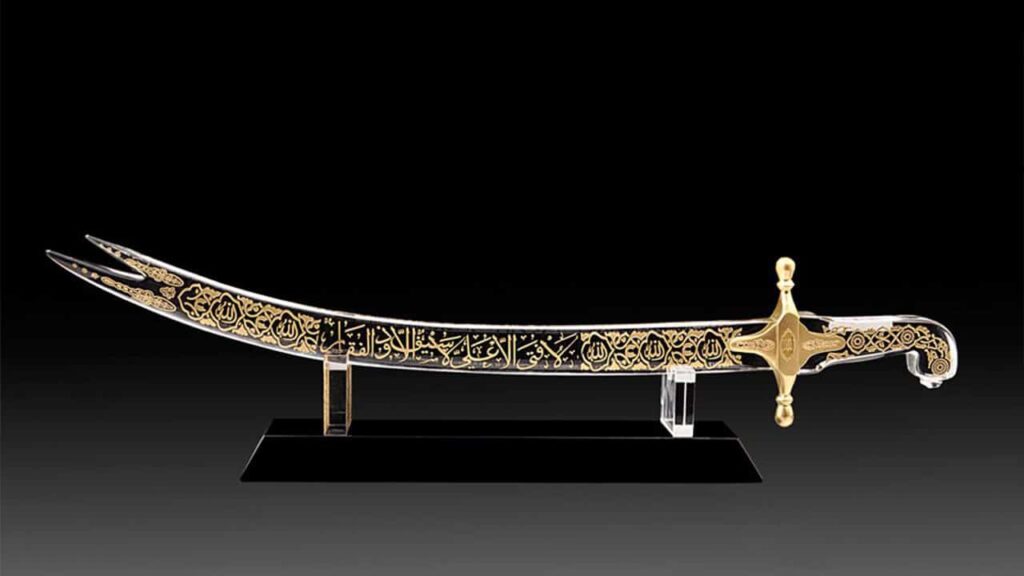The Zulfiqar sword is one of the most iconic and revered weapons in Islamic history. It represents not only a symbol of strength and power but also a deeply spiritual and historical legacy. From its unique design to the stories associated with it, the Zulfiqar sword has captured the imagination of people throughout the centuries.
In this article, we will dive deep into the history of the Zulfiqar sword, explore its religious significance, and examine its impact on Islamic culture. Whether you’re a history buff, a religious scholar, or simply curious about legendary swords, this comprehensive guide will offer you a detailed exploration of the Zulfiqar.
What is the Zulfiqar Sword?
The Zulfiqar sword is a double-edged, bifurcated blade associated primarily with Imam Ali, the cousin and son-in-law of the Prophet Muhammad. Described as having a forked or split blade, its distinct appearance sets it apart from other swords of the time.
Origins of the Zulfiqar Sword
The Zulfiqar’s origins date back to the early days of Islam, specifically during the Battle of Uhud. According to historical accounts, the Prophet Muhammad gifted this sword to Imam Ali, who used it during the battle to defend the Islamic forces.
The Battle of Uhud: A Turning Point
The Battle of Uhud was one of the most significant early conflicts in Islamic history. Despite a setback for the Muslim army, Imam Ali’s bravery and skill with the Zulfiqar sword became legendary. His defense of the Prophet Muhammad solidified the sword’s status as a symbol of protection and loyalty.
The Unique Design of the Zulfiqar Sword
The design of the Zulfiqar sword is unlike any other sword in history. Its bifurcated blade, often described as forked or split, makes it instantly recognizable.
- Distinct Blade: The forked design is thought to represent duality – perhaps the duality of justice and mercy, or strength and wisdom.
- Symbolism: The Zulfiqar has been linked with divine intervention and justice. Its unique form is said to be a physical representation of the balance between spiritual and physical power.
Why Was the Zulfiqar’s Design So Special?
The forked blade allowed for both cutting and slashing motions. This made the sword particularly effective in battle, where versatility was key. In addition to its practical use, the sword’s design was imbued with a deeper spiritual significance. It was seen as a symbol of God’s justice, wielded by Imam Ali on behalf of the Muslim community.
The Religious Significance of the Zulfiqar Sword
The Zulfiqar is not just a weapon of war; it holds profound religious significance in Islam. It’s often referred to as the Sword of Ali, with many believing it represents divine justice.
Imam Ali and the Zulfiqar: A Spiritual Bond
Imam Ali’s association with the Zulfiqar sword goes beyond its use in battle. It is believed that he was divinely chosen to wield the sword as a representative of God’s will on Earth. The phrase, “There is no sword but Zulfiqar, and there is no hero but Ali,” reflects the deep spiritual connection between the sword and its wielder.
Symbol of Justice and Power
The Zulfiqar is a symbol of justice, power, and righteousness in Islamic tradition. Imam Ali is revered for his fairness and wisdom, and the sword symbolizes these traits. For many Muslims, the Zulfiqar is a reminder of the importance of upholding justice and defending the oppressed.
The Legacy of the Zulfiqar Sword
The Zulfiqar’s legacy has endured for centuries, and its image continues to inspire people around the world. Whether as a symbol in religious art or a figure in poetry and literature, the Zulfiqar remains deeply embedded in Islamic culture.
The Zulfiqar in Islamic Art and Culture
The Zulfiqar has been depicted in various forms of Islamic art, from paintings to sculptures. It is often featured in battle scenes, where it is shown being wielded by Imam Ali. In some representations, the sword is depicted as glowing or emitting a divine light, further emphasizing its spiritual significance.
Modern Symbolism of the Zulfiqar Sword
In modern times, the Zulfiqar is still a powerful symbol. It is often used in religious parades, ceremonies, and as a symbol of resistance and protection. For many, the Zulfiqar represents not just historical events but also the timeless values of justice, bravery, and faith.
The Zulfiqar in Literature and Poetry
The sword has also found its way into poetry and literature, where it is celebrated for its symbolism and power. In Islamic poetry, the Zulfiqar is often used as a metaphor for divine justice and strength, with poets drawing parallels between the sword and the righteous path of God.
Conclusion: The Timeless Power of the Zulfiqar Sword
The Zulfiqar sword is more than just a historical artifact; it is a living symbol of justice, faith, and strength. From its role in the Battle of Uhud to its place in modern Islamic culture, the Zulfiqar continues to inspire and captivate people across the globe. As both a weapon and a spiritual symbol, the Zulfiqar holds a unique place in the hearts of Muslims, representing the values of courage, loyalty, and justice.
SwordBuy Online Sword Store. We produce our products in Yatagan, Denizli, Turkey as SwordBuy. Yatagan is a town in which swords used to be produced for Ottoman Empire Soldiers during the 16th century when important wars were happened.
FAQs
1. What makes the Zulfiqar sword unique?
The Zulfiqar sword’s bifurcated, forked blade is what sets it apart from other swords. It symbolizes duality and divine justice, making it a significant historical and spiritual artifact.
2. Who wielded the Zulfiqar sword?
The Zulfiqar sword was wielded by Imam Ali, the cousin and son-in-law of the Prophet Muhammad. He used it during significant battles, such as the Battle of Uhud.
3. What is the significance of the phrase “There is no sword but Zulfiqar, and there is no hero but Ali”?
This phrase highlights the unique bond between Imam Ali and the Zulfiqar sword. It suggests that Ali was divinely chosen to wield the sword as a symbol of justice and righteousness.
4. How is the Zulfiqar sword depicted in Islamic art?
The Zulfiqar is often depicted in Islamic art as a glowing sword, wielded by Imam Ali in battle. It is shown as a symbol of divine justice and protection.
5. Why is the Zulfiqar sword still important today?
The Zulfiqar sword remains a powerful symbol of justice, faith, and resistance in modern Islamic culture. It continues to inspire people around the world, representing timeless values.







